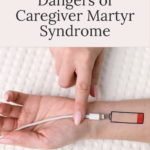
In the traditional sense, martyrs are heroes. They give up a lot, perhaps even their lives, to further an important cause.
Martyr syndrome or martyr complex is different. This is a behavioral pattern where you’re regularly giving up your own needs for other people – to the point that you often have little left.
Notably, people who act as martyrs often give above and beyond what is needed. Or, they take on all the responsibility for giving, even when others are able and willing to pitch in.
It’s an incredibly important topic, as caregivers can easily fall into the martyrdom trap – leading to what’s called caregiver martyr syndrome.
Aren’t All Caregivers Martyrs?
Honestly, no.
Caregivers tend to be loving, kind, and willing to put another person first. However, those qualities alone don’t make you a martyr.
Martyr caregivers consistently put themselves way down the bottom of the list. Often they take care of themselves only when no one else wants anything (which, let’s face it, rarely happens).
Such caregivers also have a tendency towards disempowerment.
In particular, they view life as something that happens to them. Rather than looking for solutions, they focus on the negative instead – sometimes even doubling down on their suffering in the process.
I Didn’t CHOOSE This!
It seems absurd, doesn’t it? Why would anyone choose to be involved in an overwhelming and thankless task, one that seems to go on and on and on?
The idea that you (or anyone!) might want to be in this position or be increasing your workload is even more bizarre.
In one sense, the idea truly is absurd. Few people would consciously choose to torture themselves.
But, consciously is the operative word here.
Most martyr caregivers aren’t doing so intentionally. Many will feel like they’re trapped in their role. That they have no choice and that there’s no way out.
They may have also entered the role for important reasons, like an aging parent having a fall or being unable to safely live on their own.
And yet, there is a choice aspect. If you’re in this position, then you’re often trapped more by your own choices than by the situation at hand.
Truly. I know that sounds harsh, but things only get better when you start to look for solutions. Nothing will change if you stay stuck in complaining and blaming mode.
To explain, let’s look at how caregiver martyr syndrome presents, followed by how people end up here. Then we can talk about ways out. After all, you can’t start to get out of the situation until you recognize what’s happening.
What Caregiver Martyr Syndrome Can Look Like

The presentation of martyr syndrome differs somewhat from person to person, influenced by the situation, the other people involved, and the underlying reasons.
The sections below highlight some of the main features of the problem. However, they may not all be present (or obvious) in a given situation.
A Strong Negative Attitude
Martyr caregivers often focus on the negative aspects of their role – including how difficult it is and how much they are sacrificing. Some do so only to themselves and put on a brave face around everyone else, while others may complain to everyone in sight.
The book Already Toast reminded me strongly of this pattern. The author was fast to talk about her suffering and all the challenges she faced, with little emotional acknowledgment of how much she was supported or the difficulties her partner faced (even though her partner was incredibly ill).
Taking on Increasing Responsibilities
Martyr caregivers try to be the hero again and again. Sometimes this even means they’re creating opportunities to solve other people’s problems, even when their help was never really needed.
They’ll often keep looking for new opportunities too, which can mean their workload simply gets higher over time.
Refusing Support
While martyr caregivers will often complain that no one helps them, they also tend to refuse support.
This may be justified by the idea that “no one else will get it right”, “no one understands what’s needed” or “I’m the only one who can take care of mother safely”.
Those justifications tend to be unrealistic.
Other people might have different approaches and might make mistakes, but that’s not the end of the world. Mistakes are how we learn and care can never be perfect anyway.
Lack of Self Care
Putting yourself last, failing to meet your needs, or feeling guilty about self care are all huge signs that something is wrong.
Sometimes this issue comes from the story that whatever you do for your loved one is a measure of your love. So, any time you step back (even just a little) means you love them less.
Why Some Caregivers End Up Being Martyrs
Trying to Please a Parent
If you’re caring for an aging parent, martyr syndrome can come from a desire to please. Perhaps they don’t show love often or well, so you’re going to great lengths to make them happy.
This is a recipe for disaster, as the love you’re looking for isn’t earnable. Instead, you may find that you’re constantly on the back foot – always looking for or hoping for something that doesn’t come to pass.
Internal or External Expectations
Expectations. They’re frustrating, aren’t they?
Perhaps your cultural background expects daughters to care for their aging parents. Or, maybe your own family does. Your mother cared for your grandmother, so now it’s your turn, right?
Religion is a source of some of these expectations too (we’ll get back to that one later on).
Some expectations remain external. Others become part of your makeup.
Expectations are sometimes quite hard to break, especially if many people share them. You may even end up thinking that you ‘should’ support your parent in a particular way because everyone expects you to (even though expectations really shouldn’t define your life).
Your Parent Promotes The Relationship
Some aging parents push their kids to go above and beyond. Sometimes they do this with all of their children, but other times they act like one child can’t do anything right, while the others don’t need to put any effort in.
This pattern can present for a variety of reasons, including the following:
- They’re afraid, perhaps of aging or of being alone, and being cared for makes them feel more secure.
- They’re highly self-involved (perhaps even narcissistic), so they often only see their own perspective, rather than yours.
- They don’t place high value on how you spend your time. For example, unmarried women sometimes get the brunt of caregiving duties because their parents see child rearing as incredibly important.
- They may take offense to any type of self-care, perhaps feeling that you are rejecting or abandoning them because you don’t always put them first.
- They may not understand boundaries and take offense when you try to set them.
- They may not understand how to have a healthy and balanced relationship with you. This could be because of how they were raised, a mental illness, trauma, or some other issue.
To make matters worse, the parent mightn’t recognize that they’re being unreasonable.
Some may even use a combination of fear, obligation, and guilt (FOG) to manipulate you into doing more. It’s easy to start second-guessing yourself and give in to their demands, especially if you spend a lot of time around them.
Taking Religion Too Far
Many faiths, including Christianity, have a strong service focus, where we are meant to be supporting and helping other people. This isn’t a bad thing at all – being there for others is incredibly important.
But, as we discussed in our piece on caregiver burnout Bible verses, the idea often gets taken too far.
While I believe we are called to serve, this doesn’t always mean giving up everything and certainly doesn’t mean becoming a doormat. The Bible highlights the importance of respite and being wise (even Jesus stepped away from the crowds and the good Samaritan did not remain with the injured man).
You’re Taking Responsibility for Too Much
Part of caregiving martyr syndrome is trying to help too much. Sometimes this means you’re taking on burdens that no one asked you to or even needs you to.
This is particularly common with needy or lazy parents. You may find that you’re regularly helping them with simple tasks they could easily do themselves.
In other situations, you might be pushing assistance onto parents who don’t really want or need it.
You’re Trying to Fix How Others Feel
Sometimes it’s not just the practical things you’re getting over-involved in, but the emotional ones as well.
In particular, you may be trying to make sure your parent never feels uncomfortable, disappointed, low, or rejected. This is a nice idea, but it’s not realistic.
After all, you can’t actually control how another person feels. Some people seem to actually enjoy focusing on the negative, which makes them impossible to please. If this is the case, what you do doesn’t matter, they’ll never be happy.
And, if they’re going to be miserable and annoyed at you no matter what, why not do what you need to for you first? Why constantly bend over backward for someone who will never appreciate it?
You Don’t Have Good Boundaries With Your Family
Boundaries are an essential part of any healthy relationship. They’re how we grow as individuals and how we make clear distinctions between ourselves and others.
The challenge is that boundary setting is generally learned when you’re young and not all parents teach this well. Some even get angry or resentful when their kids try to set boundaries.
If you weren’t allowed many boundaries as a kid, setting them as an adult can be difficult and confusing. Plus, if your family rejected boundaries then, they probably do now as well.
You’re Over-Identified as a Giver
Identity is a funny thing.
We often define our identity as who we are. But, more accurately, identity is how we see ourselves.
This is an important difference, as it means that you can shift your identity. You can change the way you see yourself and make changes to your life and behavior in the process.
If you’re struggling with not taking care of yourself, then you’re probably over-identified as a giver. Perhaps giving to others is one of the main ways you see yourself (you may have been conditioned into this through faith or your parents).
If this is the case, then pulling back and caring for yourself may genuinely feel wrong. It could be terrifying.
What Can You Do?

So, you think you might be a martyr. Or, at least, you might have some of the qualities. What do you do about it?
There are a variety of approaches to take, depending on your situation and needs. The following can help you get started. But, be patient with yourself. If you’ve been following the martyr paradigm for a while, it may take time and some false starts before you find your way with something new.
Practice Self-Compassion
Self-compassion is a useful tool for helping you to be gentle with yourself.
We’ve covered the concepts here at Kapok, but for more details it’s worth checking out some of Kirsten Neff’s work. Her latest book, Fierce Self-Compassion may be particularly relevant, as it speaks to the idea that women are often called to give to much and how we can balance fierceness with tenderness.
Broaden Your Identity
Over-identifying as a giver is easy, especially when you’re needed. One of the best ways out of this is to re-broaden who you are – to re-find the things that matter to you or create new aspects of your identity.
We discussed some of this in our post on caregiving and identity loss. Other writers have highlighted about this too, as investing your entire identity in a single area of your life is not wise.
If you’re a full-time caregiver, you may need to start small.
Look for things that matter to you that you can incorporate into your life. Part of the process may involve identifying your personal values, then looking at what activities and passions align with these.
Get External Advice
Martyr syndrome is very difficult to identify when you’re in the middle of it. To some degree, most of what you’re doing probably feels right.
So, you need to look outside yourself.
Ask other people about the situation. How do they see things? Do they think you’re being balanced or that you’re giving too much?
But, you’ll need to be wise here, as everyone has their own biases and expectations. No one sees things completely clearly.
If people aren’t being helpful or you can’t find safe people to connect with, look for advice from books instead. There are some fantastic books about setting boundaries, along with some for dealing with narcissistic or emotionally immature parents.
Here are a few of my favorites:
- Setting Boundaries with your Aging Parents, by Allison Bottke
- Adult Children of Emotionally Immature Parents by Lindsay Gibson
- Children of the Self-Absorbed by Nina Brown
- Will I Ever Be Good Enough?: Healing the Daughters of Narcissistic Mothers by Karyl McBride
- The Body Keeps Score by Bessel van der Kolk
Talk to a Therapist
Even just a single therapy session can be incredibly helpful. A good therapist will be able to identify when the support you provide is rooted in kindness and when there’s something dysfunctional at play.
A therapist will often be more objective and helpful than friends or family members.
They may be able to step you through the processes of finding your own feet. This could include helping you determine when and where to disengage and when to continue to provide help.
A therapist can also help you to untangle some of the emotions.
For example, if you were strongly conditioned as a giver (probably by one of your parents!), then moving away from this can be unsettling and kick up a great deal of guilt. Untangling this guilt with a professional is much easier than on your own.
Set Boundaries or Step Away
The big problem with martyrdom is that you’re giving far too much. So, the answer is to change the equation. Start to do less for others and more for yourself.
What this looks like varies depending on the situation and what’s needed.
Potential approaches include the following.
- Spend some time assessing the care recipient’s actual needs, as opposed to their wants.
- Think about which needs can be solved in other ways. For example, if you’re cleaning or gardening for your parents, can they hire someone instead? What about hiring home help?
- Work on boundary setting. Make it clear what you will and won’t do, and when.
- Refuse to be the backup. If your family member can hire help and chooses not to, don’t rush in to pick up the slack. Instead, allow things to play out (as long as they’re not actually in danger). This isn’t a fun way to do things, but sometimes it’s necessary when family members won’t listen to you.
- Make your time valuable. Regardless of whether your family understands, the time you spend on your own hobbies, work, and self-care is incredibly valuable. This needs to be a priority for you to find your way.
- Get other people involved and allow things to be imperfect. Seriously. Your parent doesn’t need to have their whims met every minute of every day. Sure, aging is uncomfortable, scary, and stressful, but so is life. Aging isn’t a magic ticket that means seniors don’t need to try anymore.
Sometimes, you might need to step away entirely.
This is most common with narcissistic or abusive parents – ones who refuse to recognize boundaries and want others to do everything for them.
Find What Works For You
Finally, there’s no one size fits all solution.
Every person, relationship, and caregiving situation is different.
Sometimes you simply need to step back a little and share the caregiving role. Other times you might need to set some firm boundaries and perhaps even step away for a time.
The most important thing is to find what works for you. It might take time to get there, but the sooner you start, the sooner you’ll find solutions.
Final Thoughts
The idea of caregiver martyr syndrome is tough, isn’t it? It suggests that many of the challenges you face are ones you’ve created – or at least facilitated.
Who wants to hear that?
But, this topic isn’t focused on blame. Instead, understanding martyr syndrome can be empowering. Once you get a sense of what’s happening, you can start to work on it and find a way forward.
Feeling Overwhelmed?
Check out our Caregiving Consulting service for personalized support and guidance.


Thank you for this informative article. Recently started getting involved in caring for my father because mom is not comfortable with different HHA coming in and out of the house. Out of four of us children, it was decided for me that as a single woman, I’m more suitable for the caregiver role. My approach to the situation aligns with what you wrote and reading it help so much to get an external perspective and help to be more firm in dealing with family members.